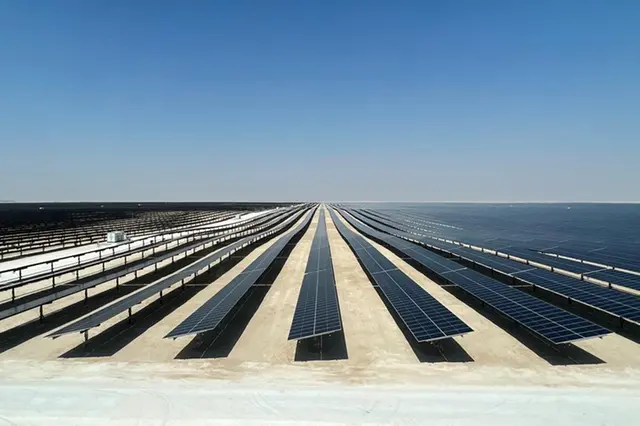Generation

Qatar s Amir inaugurates Ras Laffan and Mesaieed solar power plants

Doha, Qatar: Amir H H Sheikh Tamim bin Hamad Al-Thani inaugurated the Ras Laffan and Mesaieed solar photovoltaic power plants at the Ras Laffan Industrial City yesterday.
The two plants with a combined capacity of 875 megawatts will more than double Qatar’s solar energy production to 1,675 megawatts of renewable energy.
Addressing the inauguration ceremony, Minister of State for Energy Affairs, and President and CEO of QatarEnergy, H E Saad Sherida Al-Kaabi noted that the start of operation of the Ras Laffan and Mesaieed solar power plants constitutes an important step towards achieving the fourth pillar of the Qatar National Vision 2030, which is managing the environment in a manner that balances economic and social development and environmental protection.
It also achieves one of the goals of QatarEnergy’s Sustainability Strategy, which is to generate more than 4,000 megawatts of renewable energy by 2030. “The plants, which are fully owned by QatarEnergy, have a combined production capacity of 875 megawatts which will double Qatar’s solar power production capacity to 1,675 megawatts,” the Minister said.
“The construction of solar power plants is one of Qatar’s most important initiatives to reduce carbon dioxide emissions, to develop sustainability projects, and to diversify electricity generation sources. These plants are expected to reduce carbon dioxide emissions by about 4.7 million tons annually in addition to feeding the national electricity grid. These stations will help operate some of QatarEnergy’s facilities in Ras Laffan and Mesaieed industrial cities.
“The two plants, along with the Al-Kharsaah plant, will play a significant role in meeting the country’s electricity demand, contributing about 15 percent of the total peak electricity demand. This percentage will rise to 30 percent, God willing, with the operation of the world-scale 2,000 Megawatt Dukhan solar power plant by 2029,” he added.
The two plants were designed and built to the highest international standards to achieve the highest production indicators in terms of availability, reliability, efficiency, quality, safety and security.
Al-Kaabi said: “We have moved beyond relying on the expertise of others for the construction, operation, and maintenance of solar power plants, and have begun implementing such projects using our own national expertise. We are proud of them and their achievements.
Al-Kaabi added: “I am honoured to express our sincere thanks and gratitude to Amir H H Sheikh Tamim bin Hamad Al-Thani, for honouring us with his presence today, and for his wise guidance and unlimited support, which have a significant effect on achieving energy projects.
“I would like to take this opportunity to thank the project management team, QatarEnergy, Kahramaa, and all participating companies including Samsung, Siemens, Technip for their efforts towards completing this project,” he added.
Following the inauguration, H H the Amir inspected the solar panel control and distribution room which features the latest technologies used in generating electricity from solar energy, the two plants utility services, and their production capacity to meet a significant portion of the country’s renewable energy needs.
During the event, a documentary was shown about the construction stages of the two plants and their objectives in supporting the country’s strategy to transition to low-carbon energy and promote environmental sustainability in accordance with Qatar National Vision 2030.
The event was attended by a number of Qatar’s energy sector executives and senior officials.
Qatar is enhancing infrastructure to integrate renewable energy into the national grid, offering financial and legislative incentives to attract local and foreign investments.
The country is also supporting research and development in energy storage technologies and solar panel efficiency, forging partnerships with academic institutions and global research centres, while promoting community awareness programmes and strengthening national capacity in renewable energy operations, maintenance, and project management.












